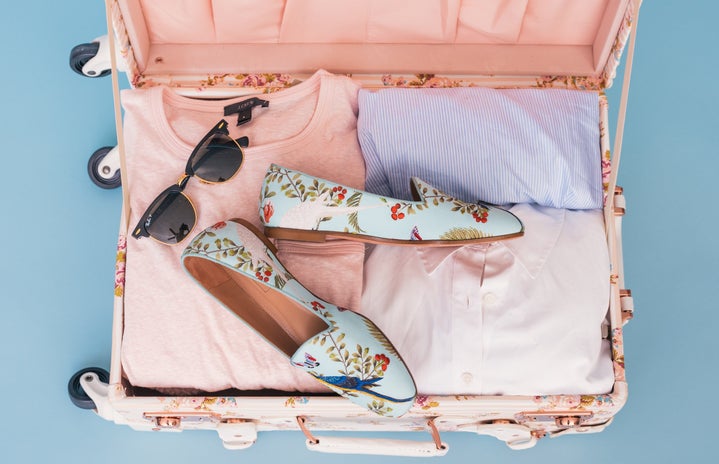Still worried about the nitty-gritty of preparing for your study abroad experience? Not sure what kind of convertor to buy? Or are you wondering about how you’re going to fit ALL your stuff into that itty-bitty suitcase? Look no further, this study abroad veteran has all the information you’ve been looking for. If you’re still in the beginning stages of preparing for your trip (aka “I haven’t applied for my visa yet!” or “when should I book my flight?”), check out How to Prepare for Study Abroad: Part 1. Then, jump right into to learning about the following things.
1. PHONES
The kind of phone you bring with you can vary a lot depending on where you’ll be traveling. I have a friend in Ecuador right now who had to buy an old flip phone because the possibility of phone theft is very high. On my abroad program in Rome, however, nearly everyone had a smartphone. Smartphones are great for traveling because they can be a laptop substitute for weekend trips when you want to be able to access Wi-Fi without lugging around extra weight.
Whatever phone you decide to use there’s also the whole process of figuring out a reliable, reasonably-priced service plan. I know a lot of people who chose to simply continue using their regular phone plans they have in the States, relying heavily on Wi-Fi to send messages and generally keep in touch with life at home and new friends abroad. What’s App, Snapchat, and Facetime are probably the top choices for students studying abroad because all they require is access to Wi-Fi. If sticking with your current phone plan just seems inordinately expensive, especially if you plan on making a lot of phone calls, there are special services for students going abroad that allow you to put in a country-specific SIM card to your unlocked phone. This is what I did, and in all honesty it was a lot more hassle than it was worth. Your time abroad could be a great chance to divorce yourself from your phone for a little while and focus on all the incredible experiences happening around you every second.
2. MAIL
Just a few of the postcards I collected from abroad that now hang on my walls as a reminder of my travels with my friends
Instant communication is great, but there’s nothing like receiving snail mail, especially when it’s a postcard of places people have never seen before. I found one of the best ways to remind my friends how much I missed them was to send them little notes about what I’ve been seeing. Postcards are especially great for family members who maybe you’re not quite comfortable sending a quick Facebook message every now and then. Postcards, after all, are a souvenir in and of themselves. That’s why I also brought some home for my own benefit to remind myself of all the incredible places I was lucky enough to visit.
3. PLUGS
This one is a pesky necessity. Make sure to buy a converter and adapter for every country you plan on traveling to, or get one that doubles as a convertor and adapter and can be used in multiple countries. I also recommend packing more than one in case you lose one or need to charge more than one thing at a time.
4. MONEY
Budgeting is essential for your time abroad because you will almost definitely spend more money than you expect. If you’re going abroad for a year, you may want to consider opening a bank account in your host country. However, if you’ll be there only a semester, it’s much simpler just to take out money from local ATMs as needed.
Be sure to notify your bank a few weeks before leaving so that they don’t shut off your card when it starts racking up charges in foreign places. Also, be sure to tell your bank all the different countries you hope to travel to so that your weekend trip to Istanbul isn’t cut short by lack of access to your cash. Keep in mind that every time money is taken out of your account overseas, you may be subject to extra fees. For this reason, it is best to take out large chunks, around 150-250 U.S. dollars at a time, depending on how much you plan to spend.
5. GO TO THE DOCTOR
Maybe you need a physical to prove to your program that you’re healthy, maybe you need country-specific vaccinations, or maybe you just need a three-month supply of your prescriptions. You’ll be out of the country, maybe without easily accessible healthcare, so take care of all your checkups before you leave so you don’t run into problems later. Consider making a visit to the optometrist or dentist, too.
A note on prescriptions: Some countries may not allow you to mail prescriptions drugs (including birth control) into their borders without a whole lot more fuss than its worth, and local pharmacies may not carry the prescriptions you need. Make arrangements with your physicians beforehand so that you’ll have enough to last your entire time abroad, or the semester if you’re on a year-long program and plan to go home for winter break.
6. PACKING
I’m sure you’ve heard it before and you’ll hear it again: pack light. It will make your whole trip more enjoyable. Ideally, you should have only a manageably sized suitcase and a backpack. Also, keep in mind that for the weekend, or even weeklong trip like fall or spring break, you’re going to want a bag smaller than your suitcase to easily carry all your stuff around in and that can be carried with you on an airplane. A small duffel bag is ideal for this. If you buy one while abroad, you’ll even have extra space to take all the things you’ve accumulated on your travels home with you.
Looking out from Vesuvius—wouldn’t want to be carrying more than a backpack up that mountain!
The absolute best decision I made in all of my preparation for study abroad was to buy packing cubes which I could stuff most of my clothes in and save space for various other odds and ends. These were especially helpful for weekend trips because it allowed me to fit not only my clothes and toiletries in my tiny duffel bag, but also my homework (which more often than not ended up being a heavy reminder of my good intentions).
I suggest making a master list of everything you plan on bringing so that you don’t forget anything. Also, if anything happens to your suitcase on the way over, you’ll know what you’ve lost. Things to include on this list that you might not immediately think of may be:
· Ziploc and plastic bags
· Photocopies of all important documents (passport/visa, debit/credit card, insurance card)
· Earplugs
· Luggage locks
· A wash cloth (in some places, wash cloths just simply aren’t a thing people use—if you need one, bring your own)
· A travel towel if you plan on spending time in hostels
· An extra memory card for your camera
· Extra headphones
· Contact solution (your brand might not be available)
· Tampons (some countries don’t really sell tampons, so bring enough to last you)
· Fingernail clippers
· A first aid kit
As I mentioned before, make sure to pack all your prescriptions, whether that’s BC, contacts, or anything else.
You can’t plan for everything. But part of being a savvy traveler is knowing what you can plan for. Being prepared before leaving will make it easier to be spontaneous because it will give you confidence and peace of mind to know that you can handle whatever your adventures throw at you.
Image Credit: Emily Stegner, Independent, Moms Gone Global, REI, Meme Generator

